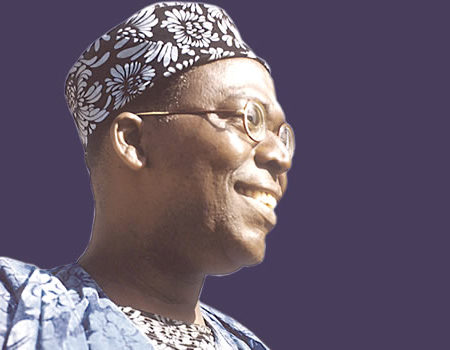Eight Years of Office
According to Awo in his autobiography, ‘…we were quite definite as to the objectives which we were going to pursue both at the centre and in the Western Region, and had fairly clear ideas as to how we would achieve them. We had all agreed to the four freedoms enunciated by me in Awo, and we were inflexibly resolved that nothing on earth should deter us from moving as fast as we ever could towards the ramified, variegated and complex goals distinctly set by them. The race before us was a historic and epoch-making one, and regardless of many obvious hazards we literally burnt with unquenchable ardour and enthusiasm to run it.’
He went further, ‘apart from administrative impediments, we did recognise that there were also financial hurdles of a mountainous height to overcome. But we were determined to blast our way through them all, and compel the force of any adverse circumstance to serve our will’.
It is no wonder then that, subsequent to the regional elections of September 24, 1951, Awo hadassembled his team of ministers by November 1951, even though they did not assume office until February 6, 1952.
Evidently as a result of their level of preparedness, they commenced the budget meeting twelve days afterwards, on February 18. Awo’s ministerial statement setting out the guiding principles was delivered on February 20, and the debate on the second reading of the Appropriation Bill started on the 21st.
On February 20, he enunciated three principles by which the drafting of the Region’s budget would be guided. Essentially, these principles were about spending more money on services which would enhance the welfare, health and education of the people at the expense of any expenditure that did not ‘answer to the same test’.
Between three and four months after assuming office, that is by May and June 1952, most of the policy papers which the Action Group published before the elections had been embodied in Sessional Papers and Bills.
Awo and his team swung into action with the unprecedented award, in 1953, of 200 post-secondary scholarships tenable in British and American Universities and in the then University College, Ibadan. Until then, the Nigerian government had not awarded as many as 20 scholarships annually.
On January 17, 1955, the epochal free primary education scheme was launched in the Western Region of Nigeria. In his budget speech in March that year, Chief Awolowo said, ‘Of our total expenditure of £12.45 million not less than 82.6% is devoted to services and projects which directly cater for the health, education, prosperity and general welfare of our people. Of this high percentage, 27.8% goes to education, 10.7% to medical services, 5.4% to agriculture…’
He went on to say in his 1955 budget speech, ‘From the figures I have just quoted, Honourable Members will see quite plainly that thrift is one of the keynotes of this government, and the general well-being of our people the supreme law’.
Consequently, in his valedictory summing up on September 3, 1959, Awo was able to catalogue his administration’s achievements in various areas, including the following:
They had put in place reforms in the local government administration and the judiciary. Indeed, the epoch-making Local Government Law was passed the same year they took office. They had also reconstituted the Native Authority Police Units to form the Local Government Police Force, to complement the Nigeria Police Force in the maintenance of law and order.
They demonstrated admirable prudence in the management of public finance, with the result that they achieved a state of solvency that allowed them to devote the bulk of their expenditure to development projects. Revenue rose from £5.39 million in 1952 to £18.48 million in 1958. This was achieved largely as a result of the economic development programme of the region.
Economic development during their tenure was hinged mainly on agriculture. Agricultural extension services were increased in scope and size, the Western Nigeria Development Corporation assisted with plantation development and industrialisation, and a policy of rural industrialisation was vigorously pursued. Textile training centres were set up to train school-leavers and Co-operative Weaving Centres were established. Farm settlements and farm institutes were, of course, also established.
Provision of infrastructure was also a key component of their economic development agenda. The road network, particularly rural roads, therefore received considerable attention, as did the provision of potable water.
The case of power generation was rather more interesting. The Electricity Corporation of Nigeria, which was a federal establishment, had been granted exclusive rights to generate electricity. Any other agency had to obtain a licence from the Federal Government.
According to Awo, ‘This was an intolerable handicap. We, therefore, fought and succeeded in getting a provision inserted in the Constitution that a Regional Government or its agency could generate electricity without obtaining a licence from the Federal Government… After due negotiation, the Western Region Government granted the ECN a loan of £1.3 million free of interest for a number of years, in order to speed up the provision of electric power in the Region both for domestic and industrial purposes.’
As I mentioned earlier, the free primary education scheme was launched in the Western Region of Nigeria on January 17, 1955. As a result of the scheme, the primary school population more than doubled between 1952 and 1959 and secondary school population rose from 9,000 in 1954 to 84,374 in 1959, a figure that was far higher than the combined population of all secondary schools in other parts of Nigeria at the time. The number of teacher training colleges was also doubled and Trade Centres were established to train technicians.
Permit me to elaborate a little on the free primary education scheme, because it demonstrates, most vividly, the Awo administration’s visioning, forward and meticulous planning, thoroughness and, most of all, the extraordinary synergy that existed between the government and the populace. These characteristics were pivotal, in my view, to the outstanding success of the administration on this and other projects.
- In 1951, the Action Group declared their intention, through their manifesto, to introduce free and compulsory primary education;
- One of the first acts of the Executive Council on assumption of office in February 1952 was to seek the approval of the House of Assembly for the scheme;
- By July 1952, the motion for universal, free, primary education had been debated and passed by the House;
- Soon afterwards, the Ministry of Education commenced registration of all children of school-going age, in order to assess, as accurately as possible, the number of classrooms, teachers and books that would be required;
- It should be pointed out that all that was required for a child’s eligibility was proof of his or her parents’ residence in the Region. There was no discrimination based on ethnicity or any other criterion;
- In January 1953, two years before the planned launch of the scheme, the process of training teachers commenced with an initial batch of 2,000 trainees. Some of the teacher training colleges started in temporary quarters and reconditioned houses;
- Funding for the construction of schools was sourced from the Cocoa Marketing Board reserves, of course after due consultation with, and consent of the farmers;
- Planning Committees were created at all levels right down to the community level. The Regional Planning Committee was under the supervision of the Minister of Lands. The committees were charged with the responsibility of acquiring sites for the new schools and settling any disputes that arose therefrom. They acquired over 3,000 sites across the region;
- Simple, cheap and airy classrooms were constructed, often with voluntary, communal labour. Government had decided that no child should travel more than three miles to attend school. The project was supervised by the Ministry of Works.
- Some home-owners gave up their homes to make up for the initial shortfall in classrooms;
- The syllabus was prepared with the help of experts, drawn from the Gold Coast Institute of Education, the Nigerian Union of Teachers and others,in order to achieve the best standard of education for the pupils;
- The cooperation that the government enjoyed from the citizenry was due, in no small measure, to the mobilisation efforts of the Regional Information Service;
- The local authorities played a huge role and weathered terrific storms in the collection of education rates and the ‘capitation tax’;
- Although the introduction of the capitation tax two years before the commencement of the scheme laid the government and its party open to spurious charges that cost their party, the Action Group, dearly in the 1954 Federal elections, they, nevertheless, remained resolute. As Chief Awolowo himself put it, ‘the pragmatist will always identify himself with the changing moods of the people, however unedifying, but the idealist will strive to make them see a wider vista, to dream great dreams and to attempt lofty heights.’;
- The Ministry of Health was charged with the responsibility for the provision of free health services to all children up to the age of eighteen to ensure that their education would not be curtailed by ill-health;
- The scheme was finally launched on January 17, 1955 with 400,000 six-year-olds attending school for the first time, thanks to a well-planned, well-coordinated, multi-sectoral and inter-ministerial approach.
The labour policy of Awo’s government was the most enlightened in the whole Federation, having introduced a 5/- per day minimum wage in 1954 (as opposed to 2/4 in other Regions)
With regard to medical and health services, Awo’s administration succeeded in fully implementing its policy of establishing at least one hospital in every administrative division, as well as some towns, within the specified tenure. Mobile dispensaries were provided and, for riverine areas, touring and ambulance launches were provided.
The commissioning of Western Nigeria Television Service (WNTV), first in Africa, was the crowning glory, so to say, of the administration, which Awo himself described as, ‘a supreme and completely satisfying success.’
In summary
The foundation of Chief Awolowo’s achievements in office was laid first with his vision for a developed Nigeria through investment in human capital. This was reflected in his party’s manifesto and policy papers.
He was fortunate to gather around him like minds and they took the message to the grassroots where it resonated and became the core of a mass movement.
On their part, Awo and his team, upon the assumption of office, were single-minded in their pursuit of ‘the greatest good for the greatest number’.
The people responded with enthusiastic support for the government’s programmes, even through their voluntary labour, when occasion demanded it.
The Way Forward
Awo said in his autobiography, ‘…who are to judge the type of persons who should be appointed to rule a particular people? The answer is: the people themselves…It is the readiness and the yearnings and aspirations of the people that will determine the calibre and character of those who will rule them…’
Continues tomorrow






